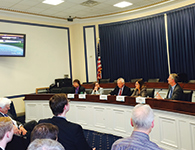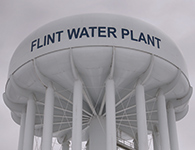NACWA Tackles Water Resilience with Congress and White House
 NACWA President Adel Hagekhalil and other Association members engaged key Congressional and Obama Administration policy leaders last week in discussions on how the municipal clean water sector is dealing with growing water management resiliency challenges. While the arid regions of the West are challenged to find innovative ways to stretch and supplement their water supply, other parts of the country are experiencing aging infrastructure, increased wet weather events, and greater pressures on existing water resources. NACWA utility members highlighted their myriad challenges on Capitol Hill and made recommendations to the Administration on how the federal government can best assist local communities to improve national water security and resilience.
NACWA President Adel Hagekhalil and other Association members engaged key Congressional and Obama Administration policy leaders last week in discussions on how the municipal clean water sector is dealing with growing water management resiliency challenges. While the arid regions of the West are challenged to find innovative ways to stretch and supplement their water supply, other parts of the country are experiencing aging infrastructure, increased wet weather events, and greater pressures on existing water resources. NACWA utility members highlighted their myriad challenges on Capitol Hill and made recommendations to the Administration on how the federal government can best assist local communities to improve national water security and resilience.
On March 16th, Hagekhalil facilitated a briefing by the Congressional Clean Water Caucus highlighting resiliency efforts by clean water utilities in the face of weather extremes. Both Co-Chairs of the Clean Water Caucus, Rep. John J. Duncan Jr. (R-TN) and Rep. Dan Lipinski (D-IL) provided remarks, as did Rep. Hanna (R-NY) who noted his personal experience with water infrastructure during his time running a construction business.
NACWA utility participants at the briefing included Brian Hoelscher of the Metropolitan St. Louis Sewer District and Bertha Goldenberg of the Miami-Dade Water and Sewer Department, who presented case studies  of the resiliency challenges their communities are facing and the great work their utilities are doing to address these issues. Additional NACWA members from the DC area also attended. Despite an unprecedented Metro Transit System shutdown the day of the briefing, the approximately 60-seat House Transportation & Infrastructure hearing room was full with a mix of Congressional members and staff, agency and administration staff, and representatives from utilities and private sector organizations. Presentations from the briefing are available on NACWA’s Utility of the Future website.
of the resiliency challenges their communities are facing and the great work their utilities are doing to address these issues. Additional NACWA members from the DC area also attended. Despite an unprecedented Metro Transit System shutdown the day of the briefing, the approximately 60-seat House Transportation & Infrastructure hearing room was full with a mix of Congressional members and staff, agency and administration staff, and representatives from utilities and private sector organizations. Presentations from the briefing are available on NACWA’s Utility of the Future website.
Hagekhalil also presented the water sector Study Group’s final conclusions to the National Infrastructure Advisory Council (NIAC) Working Group on March 14, and to White House officials on March 15. The NIAC was formed by President Obama via Executive Order to assess resilience challenges and provide recommended changes across sixteen core infrastructure sectors. Hagekhalil leads the study group that is guiding the development of the water sector report. The Study Group’s complete findings and conclusions were submitted to the Working Group in a final Summary Report. The Working Group will now make their edits to the draft study and provide the final report to the President and National Security Council this summer. The Study Group, under Hagekhalil’s leadership, has coordinated with dozens of industry, academic, cybersecurity, and resilience experts throughout the development of the findings. NACWA will distribute the final report to the membership when it is released.
WSCC Provides Input for Resilience Study
 In a related development, the Water Sector Coordinating Council (WSCC), which oversees utility partnership with federal agencies on matters related to security and emergency preparedness, convened via web meeting on March 9 and discussed resiliency issues. NACWA’s two representatives to the WSCC – Patty Cleveland, Assistant Regional Manager with the Trinity River Authority, Texas, and Chair of the WSCC, and Jim Davidson, Manager of Safety & Security for the Northeast Ohio Regional Sewer District – both participated in the meeting.
In a related development, the Water Sector Coordinating Council (WSCC), which oversees utility partnership with federal agencies on matters related to security and emergency preparedness, convened via web meeting on March 9 and discussed resiliency issues. NACWA’s two representatives to the WSCC – Patty Cleveland, Assistant Regional Manager with the Trinity River Authority, Texas, and Chair of the WSCC, and Jim Davidson, Manager of Safety & Security for the Northeast Ohio Regional Sewer District – both participated in the meeting.
The WSCC received a briefing from U.S. Department of Homeland Security on the study of water sector resilience that is being conducted by the National Infrastructure Advisory Council (NIAC) (see related story) and provided input on the findings. The WSCC also discussed cybersecurity and how the water sector associations can address the current state of utility cybersecurity, especially in light of the recent power outage in Ukraine that was caused by a hacker.
NACWA Advances Stormwater Proposal in Meetings with House Committee Leaders
 NACWA President Adel Hagekhalil and CEO Adam Krantz met with House Transportation and Infrastructure Committee Chairman Bill Shuster (R-PA) and Water Resources and Environment Subcommittee Chairman Bob Gibbs (R-OH) last week to discuss support for a NACWA legislative proposal
NACWA President Adel Hagekhalil and CEO Adam Krantz met with House Transportation and Infrastructure Committee Chairman Bill Shuster (R-PA) and Water Resources and Environment Subcommittee Chairman Bob Gibbs (R-OH) last week to discuss support for a NACWA legislative proposal 
 tied to the Water Resources Development Act (WRDA). NACWA’s proposal would encourage the Army Corps of Engineers (ACOE) to coordinate with local stormwater and clean water agencies where appropriate in the development of flood control projects authorized by WRDA.
tied to the Water Resources Development Act (WRDA). NACWA’s proposal would encourage the Army Corps of Engineers (ACOE) to coordinate with local stormwater and clean water agencies where appropriate in the development of flood control projects authorized by WRDA.
NACWA is urging support for the proposal so that local communities struggling with diminishing water supplies due to persistent drought or with degradation of surface water quality due to extreme wet weather events can work with the ACOE to ensure that flood control projects are integrated with local efforts to address these broader water resource challenges.
In addition to meeting with the Republican leaders, NACWA also met with Chairman Gibbs’ Democratic counterpart, Representative Grace Napolitano (D-CA), and her staff to discuss this proposal. Chairman Shuster is preparing to lead the House legislative effort to reauthorize WRDA this year and his support for NACWA’s proposal will be critical. NACWA’s discussions with Congressional leaders on the proposal were positive, and the Association will continue to be closely engaged in efforts to address stormwater issues as the WRDA bill moves forward.
In other WRDA-related legislative activities, the Senate Environment and Public Works Committee began hearings March 16 in preparation for its WRDA reauthorization effort and received testimony from ACOE Assistant Secretary Jo-Ellen Darcy and Lieutenant General Thomas Bostick. In February, NACWA’s Board of Directors approved a Targeted Action Fund (TAF) request to support the WRDA legislative push on behalf of NACWA’s stormwater advocacy program.
Congress Focuses on Flint Crisis, EPA Chief Pens Op-Ed
 Congress zeroed in on the continuing water crisis in Flint, Michigan last week, holding hearings with top officials to better understand the causes of the lead issues in Flint and how to prevent such an occurrence again elsewhere in the country. EPA Administrator Gina McCarthy and Michigan Gov. Rick Snyder testified before a House committee on March 17, and tempers ran high as House members from both parties sought to hold McCarthy and Snyder accountable. Both witnesses acknowledged breakdowns at the federal and state level in protecting the citizens of Flint, but did not shed any new light on the origins of the crisis.
Congress zeroed in on the continuing water crisis in Flint, Michigan last week, holding hearings with top officials to better understand the causes of the lead issues in Flint and how to prevent such an occurrence again elsewhere in the country. EPA Administrator Gina McCarthy and Michigan Gov. Rick Snyder testified before a House committee on March 17, and tempers ran high as House members from both parties sought to hold McCarthy and Snyder accountable. Both witnesses acknowledged breakdowns at the federal and state level in protecting the citizens of Flint, but did not shed any new light on the origins of the crisis.
The House also heard testimony March 15 from the former EPA Region 5 Administrator and the former emergency manager for Flint, both of whom played a role in developments leading up to the crisis. Both officials defended their actions but agreed that more could have been done to prevent the lead contaminant of the city’s drinking water. Congress additionally continues to discuss the possibility of new federal funding to assist Flint, but those negotiations are still bogged down and any resolution will have to wait until the Senate returns from its Spring recess.
In related developments, Administrator Gina McCarthy penned an op-ed March 14 about the situation in Flint, noting that the crisis has elevated the water infrastructure issues plaguing many communities around the nation – especially those with low-income populations. McCarthy also highlighted the importance of looking at these infrastructure concerns from an environmental justice perspective. NACWA has long encouraged EPA to view infrastructure issues and affordability concerns through an environmental justice lens, and is pleased the Agency seems to be moving in this direction. The American Water Works Association (AWWA) also published an op-ed on March 11 calling for a national path forward for removal of all lead service lines.
NACWA’s Board of Directors has formed an “ad hoc” group of Board members to further discuss the situation in Flint and NACWA’s appropriate role in response. This group will provide additional feedback to the Association’s leadership at the next Board meeting in April.
House Democrats Submit $4 Billion SRF Request
 On March 15, nearly 100 House Democrats sent a letter
On March 15, nearly 100 House Democrats sent a letter  to Appropriators requesting $4 billion in federal funding for the State Revolving Funds in Fiscal Year (FY) 2017, to be split evenly between the Clean Water State Revolving Fund (CWSRF) and the Drinking Water State Revolving Fund (DWSRF). NACWA previously highlighted this effort led by the minority-party leadership of the House Transportation & Infrastructure and Energy & Commerce committees. The 100 signatures represent a strong demonstration of support for the SRFs.
to Appropriators requesting $4 billion in federal funding for the State Revolving Funds in Fiscal Year (FY) 2017, to be split evenly between the Clean Water State Revolving Fund (CWSRF) and the Drinking Water State Revolving Fund (DWSRF). NACWA previously highlighted this effort led by the minority-party leadership of the House Transportation & Infrastructure and Energy & Commerce committees. The 100 signatures represent a strong demonstration of support for the SRFs.
Thank you to all NACWA members who contacted their Congressional delegation regarding these critical infrastructure funding programs. If you have not done so, now is still a good time to weigh in as FY17 funding levels will be proposed by the House and Senate later this Spring.
Hotel Deadline Extended for 2016 Policy Forum!
 The hotel deadline for the 2016 National Water Policy Forum, Fly-In & Expo has been extended until March 25. Join NACWA and our partners in Washington, April 11-13, 2016 -- it is critical for federal policymakers to hear from you about the important work your utility is doing! Limited rooms are still available, so make your plans now to attend.
The hotel deadline for the 2016 National Water Policy Forum, Fly-In & Expo has been extended until March 25. Join NACWA and our partners in Washington, April 11-13, 2016 -- it is critical for federal policymakers to hear from you about the important work your utility is doing! Limited rooms are still available, so make your plans now to attend.
Legal Web Seminar Addresses Supreme Court, Nutrients & Flint Water Crisis
 NACWA hosted a Hot Topics in Clean Water Law Web Seminar on March 16 covering three significant clean water topics. Mark Miller, Managing Attorney of Pacific Legal Foundation's Atlantic Center, presented Justice Scalia’s Passing: Will it Affect WOTUS at SCOTUS? Miller, one of two attorneys representing Hawkes Co. in its challenge of an Army Corps jurisdictional determination set for oral argument before the U.S. Supreme Court on March 30, addressed the potential impact of Scalia’s absence on the case and the ongoing litigation over the Waters of the US rule. In response to questions regarding President Obama’s March 16 announcement of his nomination of D.C. Circuit Chief Judge Merrick Garland to the Court, Miller also noted that whoever fills the vacancy will have a significant impact on these matters given the Court’s divide on prior clean water rulings.
NACWA hosted a Hot Topics in Clean Water Law Web Seminar on March 16 covering three significant clean water topics. Mark Miller, Managing Attorney of Pacific Legal Foundation's Atlantic Center, presented Justice Scalia’s Passing: Will it Affect WOTUS at SCOTUS? Miller, one of two attorneys representing Hawkes Co. in its challenge of an Army Corps jurisdictional determination set for oral argument before the U.S. Supreme Court on March 30, addressed the potential impact of Scalia’s absence on the case and the ongoing litigation over the Waters of the US rule. In response to questions regarding President Obama’s March 16 announcement of his nomination of D.C. Circuit Chief Judge Merrick Garland to the Court, Miller also noted that whoever fills the vacancy will have a significant impact on these matters given the Court’s divide on prior clean water rulings.
Two other presentations focused on issues involving cooperative federalism. Karen Hansen, a Principal with NACWA Legal Affiliate Beveridge & Diamond, presented Numeric Nutrient Criteria & EPA Necessity Determinations: Mississippi River Basin Litigation Update. Hansen, who represents NACWA as an intervenor in Gulf Restoration Network v. EPA, explained a Fifth Circuit decision in the case upholding EPA’s discretion to defer to the states rather than make a necessity determination, and provided a detailed update on the current remand of the statutory sufficiency of EPA’s decision.
Brent Fewell, Founder of NACWA Legal Affiliate Earth & Water Group, presented The Failure of Cooperative Federalism in Flint Michigan: Implications for EPA Oversight. Fewell, a former EPA official, highlighted the key issues that led to the crisis and provided insight into the incident’s likely impact on EPA’s relationship with states and the regulated community going forward.
A recording of the webinar as well as presentation slides are available on NACWA’s website. Join us for the next Hot Topics in Clean Water Law Web Seminar on June 15, 2016 from 2:00 – 3:30 pm Eastern. Please send suggestions on topics to cover in future web seminars to
Erica SpitzigThis e-mail address is being protected from spambots. You need JavaScript enabled to view it
or
Amanda WatersThis e-mail address is being protected from spambots. You need JavaScript enabled to view it
.
Great Lakes Utilities Discuss EPA Plans on CSO Public Notification Requirements
 Utilities with combined sewer systems from across the Great Lakes region gathered by conference call on March 17 to discuss EPA’s plans for addressing language in the FY 2016 appropriations bill directing the Agency to develop public notice requirements for combined sewer overflows (CSOs) into the Great Lakes.
Utilities with combined sewer systems from across the Great Lakes region gathered by conference call on March 17 to discuss EPA’s plans for addressing language in the FY 2016 appropriations bill directing the Agency to develop public notice requirements for combined sewer overflows (CSOs) into the Great Lakes.
During the call, NACWA staff thanked the utilities for their ongoing support through the last half of 2015, which helped NACWA in its negotiations to successfully remove the more onerous CSO elimination provisions from the final language. Association staff also updated the members on EPA’s efforts to date to develop the notification requirements.
NACWA has met with EPA to discuss the Agency’s plans for implementing the public notice requirements, but EPA has not yet made any final decisions on how it will proceed. What is clear is that EPA is moving on a very tight schedule, with the appropriations language requiring that the provisions be implemented “by not later than 2 years after the date of enactment.”
Though the appropriations language was limited to CSOs in the Great Lakes, EPA has expressed interest in applying the new public notice requirements nationwide. NACWA has objected to making the requirements applicable nationwide given the limited scope of Congress’ directive in the appropriations bill, but EPA believes it likely has the authority to do so. NACWA will be working with the utilities in the Great Lakes to collect additional information on the burden associated with monitoring CSO outfalls to provide the information outlined by Congress, including the dates and times of the discharge as well as the volume, and will provide that information to EPA as it works to outline its plan for implementation. NACWA will also continue to oppose any efforts to apply the notification requirements outside the Great Lakes region.
Legislation to Advance Water Technology Introduced
 On March 14, Senator Baldwin (D-WI) introduced S. 2763, the Water Technology Acceleration Act. This legislation would amend the Clean Water Act (CWA) and Safe Drinking Water Act (SDWA) to accelerate the development and deployment of innovative water technologies. The bill would amend within the CWA the list of eligible CWSRF activities to include the deployment of innovative water technologies that address nonpoint source agricultural pollution, advance resource recovery in water and wastewater treatment, or reduce wet weather sewer overflows. The bill would authorize up to $100 million in additional funding for the CWSRF each year to be available specifically for these new uses. Similarly, eligible DWSRF uses would be added to the SDWA to accelerate technology development and deployment.
On March 14, Senator Baldwin (D-WI) introduced S. 2763, the Water Technology Acceleration Act. This legislation would amend the Clean Water Act (CWA) and Safe Drinking Water Act (SDWA) to accelerate the development and deployment of innovative water technologies. The bill would amend within the CWA the list of eligible CWSRF activities to include the deployment of innovative water technologies that address nonpoint source agricultural pollution, advance resource recovery in water and wastewater treatment, or reduce wet weather sewer overflows. The bill would authorize up to $100 million in additional funding for the CWSRF each year to be available specifically for these new uses. Similarly, eligible DWSRF uses would be added to the SDWA to accelerate technology development and deployment.
The bill would also create a grant program within EPA to help finance public-private partnerships that deploy, test, and improve emerging water technologies which address pressing water issues. Lastly, the bill would require EPA to report to Congress annually regarding use of CWSRF for innovative technologies, barriers to the clean water sector’s implementation of innovative technologies, and the potential for infrastructure cost-savings.
NACWA provided feedback on initial drafts of the legislation to Sen. Baldwin’s office, and is supportive of her efforts to advance efforts that encourage greater innovation in the water sector.
USDA Announces Next RCPP Application Period
 The U.S. Department of Agriculture (USDA) released an Announcement for Program Funding on March 14 for the third round of Regional Conservation Partnership Program (RCPP) projects. RCPP was created in the 2014 Farm Bill and leverages local leadership to establish partnerships to work with landowners on landscape- and watershed-scale conservation solutions. Several NACWA members received RCPP funding in the most recent round. The application process begins with Pre-Proposals, which are due May 10, 2016. A total of $260 million is available nationally through this current round of funding. For more information and a link to application materials visit the USDA’s RCPP website.
The U.S. Department of Agriculture (USDA) released an Announcement for Program Funding on March 14 for the third round of Regional Conservation Partnership Program (RCPP) projects. RCPP was created in the 2014 Farm Bill and leverages local leadership to establish partnerships to work with landowners on landscape- and watershed-scale conservation solutions. Several NACWA members received RCPP funding in the most recent round. The application process begins with Pre-Proposals, which are due May 10, 2016. A total of $260 million is available nationally through this current round of funding. For more information and a link to application materials visit the USDA’s RCPP website.
- Applications
 are now being accepted for NACWA's Peak Performance Awards program for permit compliance in the 2015 calendar year. The application deadline is April 8.
are now being accepted for NACWA's Peak Performance Awards program for permit compliance in the 2015 calendar year. The application deadline is April 8.
- Register for the National Water Policy Forum, Fly-In & Expo, April 11-13, 2016 in Washington, DC. In light of the drought in the West, the crisis in Flint, Michigan, and public concerns over the operations of the nation's water systems, it is critical for federal policymakers to hear from you about the important work your utility is doing! Hotel deadline extended to March 25!
- Become a supporting organization of Water Week 2016! The week of April 10, 2016 has been designated as a week for the water sector to work together to highlight critical water issues shared by all states, cities, and communities.
- Earn recognition for your utility through NACWA's Excellence in Management Recognition Program
 . Nominations are now open and applications are due on April 15.
. Nominations are now open and applications are due on April 15.
- Registration is now open for NACWA's Pretreatment & Pollution Prevention Workshop, May 17-20 in Long Beach, CA. Optional training courses will be held on May 17, with the Workshop program on May 18-20.
- EPA announced the release of the Integrating Human Health and Well-Being with Ecosystem Services Request for Applications (RFA). This RFA's goal is to fund community-based research that will foster better understanding of how human health and well-being are interconnected with - and dependent on - ecosystem services. Applications will be accepted until April 21.
- The National Association of Flood and Stormwater Management Agencies (NAFSMA) has officially opened its 2016 Green Infrastructure Awards Program to recognize communities using GI to advance their wet weather management goals and enhance their communities. Applications are due on May 17. Applications are also available for a separate recognition program for communication
 around "Improving Water Quality".
around "Improving Water Quality".

Building Resiliency in St. Louis
Guest blogger Lance LeComb, Manager of Public Information and Spokesperson for the Metropolitan St. Louis Sewer District (MSD), discusses his utility’s response to recent massive flooding which impacted their system and how MSD is working to plan for a climate resilient future. Read on to find out more.